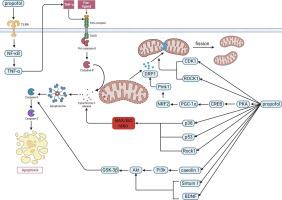当前位置:
X-MOL 学术
›
Brain Res.
›
论文详情
Our official English website, www.x-mol.net, welcomes your feedback! (Note: you will need to create a separate account there.)
Propofol-induced hippocampal Neurotoxicity: A mitochondrial perspective
Brain Research ( IF 2.9 ) Pub Date : 2024-02-29 , DOI: 10.1016/j.brainres.2024.148841 Moein Ebrahimi , Ali Dabbagh , Firoozeh Madadi
Brain Research ( IF 2.9 ) Pub Date : 2024-02-29 , DOI: 10.1016/j.brainres.2024.148841 Moein Ebrahimi , Ali Dabbagh , Firoozeh Madadi

|
Propofol is a frequently used anesthetic. It can induce neurodegeneration and inhibit neurogenesis in the hippocampus. This effect may be temporary. It can, however, become permanent in vulnerable populations, such as the elderly, who are more susceptible to Alzheimer's disease, and neonates and children, whose brains are still developing and require neurogenesis. Current clinical practice strategies have failed to provide an effective solution to this problem. In addition, the molecular mechanism of this toxicity is not fully understood. Recent advances in molecular research have revealed that apoptosis, in close association with mitochondria, is a crucial mechanism through which propofol contributes to hippocampal toxicity. Preventing the toxicity of propofol on the hippocampus has shown promise in in-vivo, in-vitro, and to a lesser extent human studies. This study seeks to provide a comprehensive literature review of the effects of propofol toxicity on the hippocampus via mitochondria and to suggest translational suggestions based on these molecular results.
中文翻译:

异丙酚诱导的海马神经毒性:线粒体视角
异丙酚是一种常用的麻醉剂。它可以诱导海马神经变性并抑制神经发生。这种影响可能是暂时的。然而,在弱势群体中,它可能会成为永久性的,例如更容易患阿尔茨海默病的老年人,以及大脑仍在发育并需要神经发生的新生儿和儿童。目前的临床实践策略未能为这一问题提供有效的解决方案。此外,这种毒性的分子机制尚不完全清楚。分子研究的最新进展表明,细胞凋亡与线粒体密切相关,是异丙酚导致海马毒性的重要机制。预防异丙酚对海马体的毒性已在体内、体外以及较小程度上的人体研究中显示出前景。本研究旨在对丙泊酚毒性通过线粒体对海马的影响提供全面的文献综述,并根据这些分子结果提出转化建议。
更新日期:2024-02-29
中文翻译:

异丙酚诱导的海马神经毒性:线粒体视角
异丙酚是一种常用的麻醉剂。它可以诱导海马神经变性并抑制神经发生。这种影响可能是暂时的。然而,在弱势群体中,它可能会成为永久性的,例如更容易患阿尔茨海默病的老年人,以及大脑仍在发育并需要神经发生的新生儿和儿童。目前的临床实践策略未能为这一问题提供有效的解决方案。此外,这种毒性的分子机制尚不完全清楚。分子研究的最新进展表明,细胞凋亡与线粒体密切相关,是异丙酚导致海马毒性的重要机制。预防异丙酚对海马体的毒性已在体内、体外以及较小程度上的人体研究中显示出前景。本研究旨在对丙泊酚毒性通过线粒体对海马的影响提供全面的文献综述,并根据这些分子结果提出转化建议。



























 京公网安备 11010802027423号
京公网安备 11010802027423号